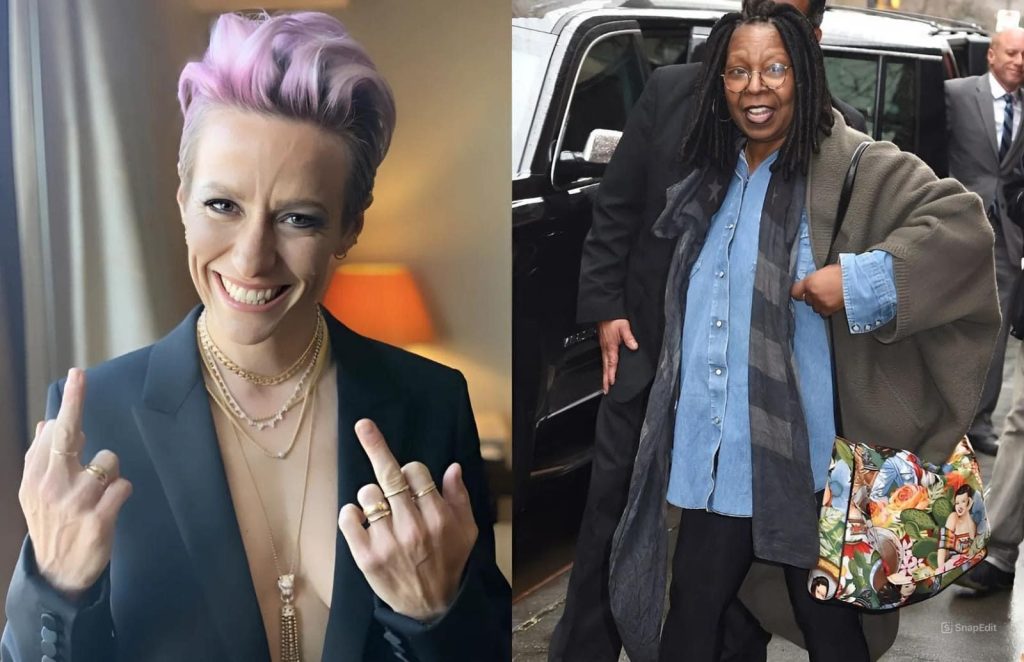In recent weeks, the spotlight has turned to two prominent American figures, Whoopi Goldberg and Megan Rapinoe, as they publicly discussed their discontent with the state of respect and recognition in the United States.
Both Goldberg, a revered actress, comedian, and talk show host, and Rapinoe, an acclaimed soccer player and activist, have expressed feelings of frustration and disillusionment with their home country. Their comments have ignited widespread debate about respect, recognition, and the state of public discourse in America.
Whoopi Goldberg, known for her multifaceted career in entertainment and her outspoken views on social issues, has long been a significant voice in American culture. Her candid remarks about potentially leaving the country highlight a broader concern regarding the treatment of influential figures who advocate for change and social justice.
Goldberg’s career spans decades, and her contributions to film, television, and stage have earned her accolades and respect. Yet, recent comments suggest that she feels her efforts and those of her peers are not fully appreciated or respected in the current climate.
Megan Rapinoe, a leading figure in women’s soccer and a vocal advocate for gender equality and LGBTQ+ rights, shares a similar sentiment. Her achievements on the soccer field are matched by her activism, which has made her a prominent public figure.
:max_bytes(150000):strip_icc():focal(748x126:750x128)/whoopie-goldberg-012924-53fdb9aee8a64bad8c8ebfb569ce00c6.jpg)
Rapinoe’s outspokenness on issues such as equal pay and social justice has often placed her in the crosshairs of controversy and criticism. Her comments about leaving America reflect her frustration with the ongoing struggles for equality and recognition that she and many others face.
The idea of leaving the country as a form of protest or statement is not new, but it carries particular weight when voiced by high-profile figures like Goldberg and Rapinoe. Their discussions about potentially relocating underscore a deep-seated dissatisfaction with how their contributions and advocacy are perceived and valued.
For Goldberg and Rapinoe, the notion of leaving is not just about personal dissatisfaction but about a broader commentary on the state of American society and the respect afforded to those who push for change.
In their public statements, both Goldberg and Rapinoe have touched upon several key issues that contribute to their feelings of being undervalued. Goldberg has pointed to a lack of respect for diverse voices and the challenges faced by those who challenge the status quo.
Rapinoe has highlighted the ongoing struggles for equality and the often hostile response to activists who demand change. Their frustrations reflect a wider sentiment among many who feel that their efforts to advance social justice and equality are met with resistance rather than recognition.
The reaction to their comments has been mixed. Some supporters have expressed solidarity with Goldberg and Rapinoe, applauding their bravery in speaking out and advocating for respect and recognition.
Others, however, have criticized their statements, questioning whether leaving the country is a productive solution or merely a dramatic gesture. The debate underscores the complexities of addressing social issues in a polarized environment and the challenges faced by those who seek to make a difference.
Ultimately, the discussions surrounding Whoopi Goldberg and Megan Rapinoe’s potential departure from America raise important questions about respect, recognition, and the treatment of influential figures in the public sphere.
Their experiences highlight the broader struggles faced by activists and advocates who work to challenge societal norms and push for progress. As their stories continue to unfold, they serve as a reminder of the ongoing need for dialogue and understanding in addressing the issues that shape American society.




